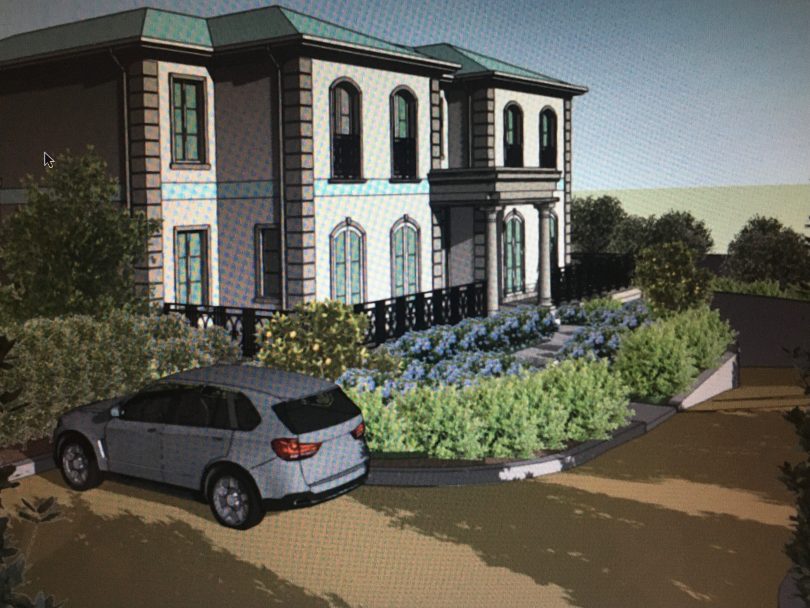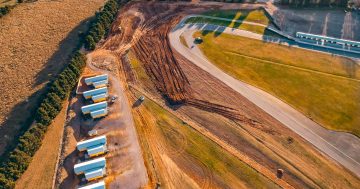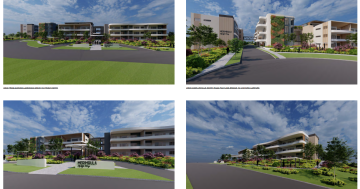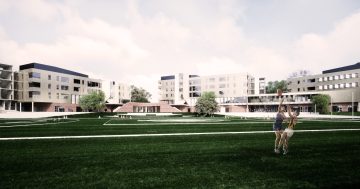
This house at 22 Hurst Street in Goulburn is at the centre of a planning battle to save it from demolition.
The proposed demolition of the first home built in Hurst Street, Goulburn, has outraged neighbours and sparked a heated response.
Residents are writing objections, organising petitions and delegations to Goulburn Mulwaree Council. They are researching the home at 22 Hurst Street and local government and heritage guidelines.
A fierce battle is shaping up.
Residents in Hurst Street, Bradley Street and Cowper Street are mounting a challenge against the applicant, who wants to flatten the home, ‘Banksia’, to build a larger two-storey mansion with an extraordinary amount of basement car parking.
Neighbours say the applicant’s architectural report overemphasises renovations and cracks in the 1888 home, while downplaying the impact the redevelopment will have on the leafy Goulburn Heritage Conservation Area.
“Every brick home in Goulburn has cracks in it,” said a long-term Hurst Street resident.
The applicant wants to replace the single-storey sandstock-brick home on a double block with a $1 million home with huge living spaces. Plans show the proposed grey-tiled and cement-rendered home with white aluminium doors and windows has three large living spaces, seven bedrooms and six bathrooms.
Horrified neighbours say the new home is over-scaled compared to neighbouring homes and will overshadow one home and overwhelm all nearby homes. Much like the demolition of cottages in Clinton Street to make way for a 7-Eleven service station, this issue is likely to be voted on by councillors and could well end up in the NSW Land and Environment Court.
A Goulburn heritage advocate said for many years groups have lobbied Goulburn Mulwaree Council for tighter guidelines to protect places such as the home under threat. Long submissions responding to development applications, revised heritage policies, and pleas to list clusters of homes and streetscapes have fallen on deaf ears, she said.
Sydneysiders who have bought Hurst Street homes in recent years are among the angriest opponents of the redevelopment. They were among 31 residents who gathered during a recent weekend to begin a campaign to fight the redevelopment.

Artist’s impression of the proposed new home in the development application at 22 Hurst Street, which is exhibited on Goulburn Mulwaree Council’s website. Submissions close on 16 November. Image: Goulburn Mulwaree Council.
Regarded as the jewel in Goulburn’s early Federation and Edwardian architecture, Hurst Street has been home to prominent people such as Nell Engineering co-founder and adventurer Dick Nell; pathologist Dr Alan Hazelton, who served on the infamous Burma Railway line with Weary Dunlop; wool pioneer Richard Maple-Brown; and gynaecologist Dr Noel Docker, who is best remembered for riding his two-wheel bike to deliver numerous babies.
In the early 20th century, former Goulburn Mayor and retailer John Knowlman lived in the Queen Anne-styled ‘Shanklin’, a 1911 heritage-listed home next to the house under threat of demolition.
Acclaimed architect EC Manfred designed and lived in ‘Boronia’ at 8 Hurst Street. He designed three homes in the street. Later, eminent surgeon Dr John Crawford also lived at number eight.
Residents’ research reveal Banksia was built by Arthur John Sach in March 1888. Sach was master-in-charge of Goulburn Technical College for more than 30 years and founder of the Goulburn Art Society. His wife, Annie, was president of Goulburn Women’s Suffrage League (later the Goulburn Women’s Liberal League).
“Goulburn prides itself on its heritage,” says a Hurst Street resident. “It uses heritage as a tourist attraction. The community has made some bad mistakes before, [for example] demolishing the Odeon and Empire theatres. Everyone regrets that now. We don’t want to demolish any more valuable heritage buildings.”
The proposed new home is below the allowable eight-metre height restriction, but one resident, who has drawn a to-scale diagram of what is proposed, says it is over-scaled and will overshadow one of the neighbouring homes.
The development application says the old home has been extended and renovated, has little original fabric and the roof has been replaced. Objectors dispute the justification for demolition and believe the home still has sufficient period features and style to warrant protection to help preserve its heritage setting.
Residents fear construction of the basement because of extensive piledriving equipment needed for the excavation and potentially damaging neighbouring homes. Neighbouring properties, constructed in a similar manner, on similar terrain and subject to similar environmental factors could be particularly vulnerable to damage from extensive vibrations caused by piledriving.
















